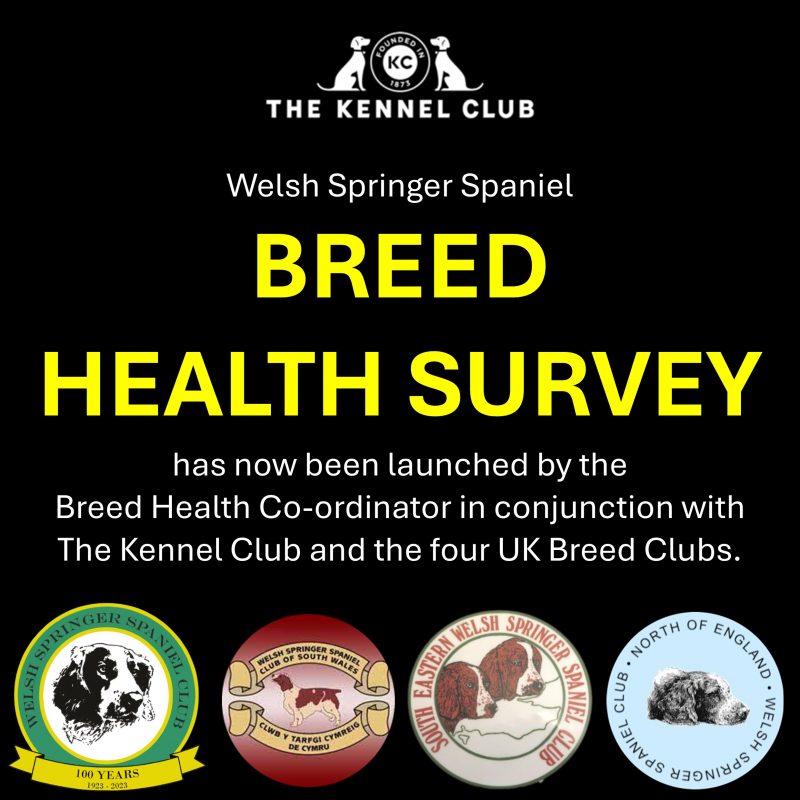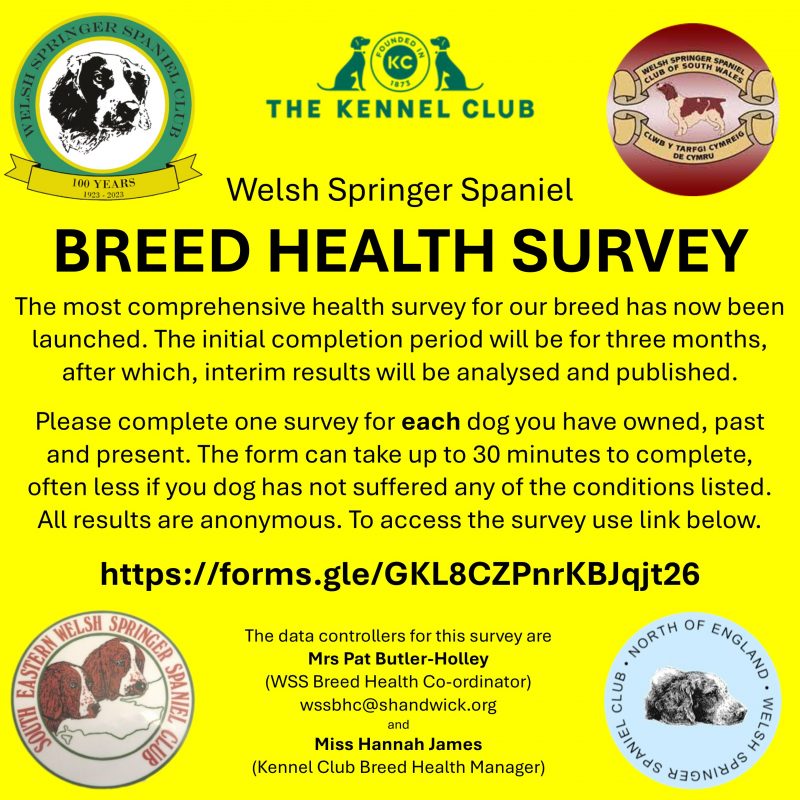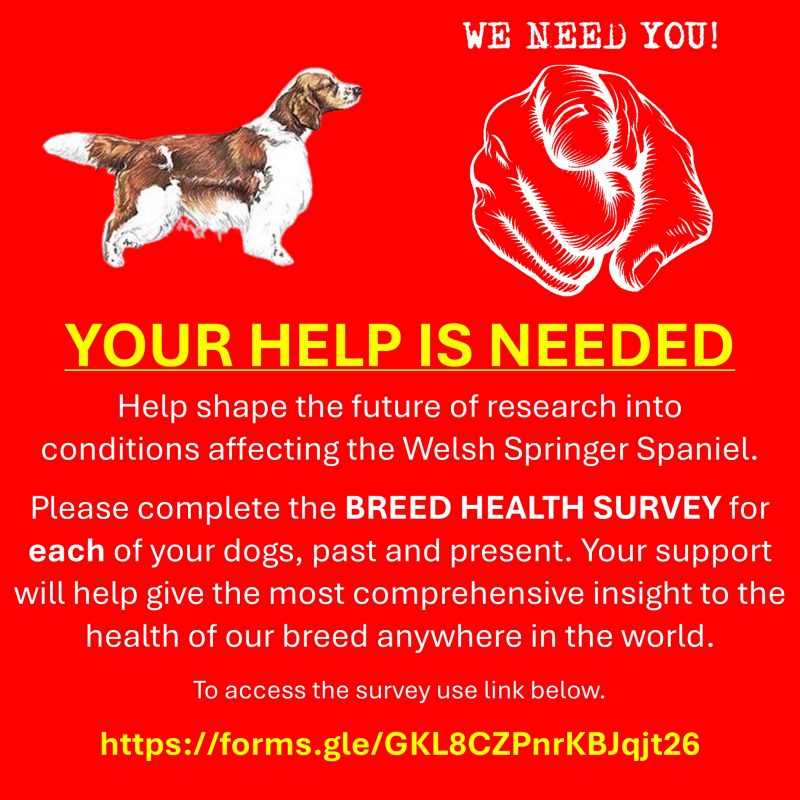Health and Welfare Overview
A small proportion of Welsh Springers are affected by hereditary defects. Fortunately these affect only a few dogs and all Welsh Springer Spaniel Club members are made aware of these conditions via the Club’s Yearbook and Newsletters. As a breed the Welsh Springer Spaniel is no less healthy than any other and the open information policy ensures that breeders are kept well informed of developments.
The breed has a Joint Health Group (JHG) which was formed in 1994 to monitor the health of the breed and seek specialist help in dealing with well known health issues. The group is made up of delegates from each UK Breed Club who pool information for the good of all. More information about the JHG can be found below.
In addition to the JHG the breed also benefits from a Kennel Club Breed Health Co-Ordinator. This role now exists for all pedigree dog breeds in the UK and allows the public a direct contact between their breed and the Kennel Club about an health concerns within the breed. More information about this role can be found below.
Breed Health Survey
BREED HEALTH SURVEY LAUNCHED.
On behalf of the Breed Health Co-ordinator (BHC), Mrs Pat Butler-Holley, in conjunction with The Kennel Club and the four UK Breed Clubs, we are pleased to announce that the Breed Health Survey is now live and ready for your input.
This comprehensive survey has been designed in conjunction with The Kennel Club to give an up-to-date insight into the health conditions affecting the Welsh Springer Spaniel. The survey will run for an initial three months, after which interim results will be analysed by The Kennel Club and published.
We need your help… PLEASE complete the survey for each of your Welsh Springer Spaniels, past and present. The responses are anonymous, unless you elect to identify yourself (or your dog), so please be as honest about any health conditions as you can. The survey results will help shape any future research into conditions affecting the breed.
To complete the survey please go click on
https://forms.gle/GKL8CZPnrKBJqjt26
The survey can take up to 30 minutes per dog to complete. However, dogs without any conditions can be completed in a much shorter time. There is no rush to complete the survey so those with multiple dogs may complete surveys over a longer period of time. As stated above, initially a period of three months has been set, after which, interim results will be analysed by The Kennel Club and published via the BHC and the Breed Clubs.
The data controllers for this survey are Mrs Pat Butler-Holley (WSS BHC), wssbhc@shandwick.org and Miss Hannah James (Breed Health Manager, The Kennel Club).
For any further information please contact the BHC directly on the email address above.



Microchipping
Since 6th April 2016, all dogs must be microchipped under the Microchipping of Dogs Regulations applicable to their country of residence.
As of that date, keepers of dogs and puppies over the age of eight weeks must also have registered their pet’s microchip details on one of the authorised databases. These databases are run by private companies, and not by the government or the council.
To check if the site you have been given to register the microchip is valid please go to Chip It Check It or The Kennel Club Please be aware of unauthorised sites.
Dog keepers are required to keep their pet’s details up to date with the database under the new law.
As well as being microchipped, it is still a legal requirement for dogs to wear a collar and tag with the keeper’s name and address on it when in a public place.
Keepers who do not get their dog microchipped and registered may face a fine.
The only exceptions to this law for pet dogs are those who a vet believes should not be chipped for health reasons.
Your breeder will give you instructions on how to do this, including the website address and a transfer code. Your breeder must be the first registered keeper of your dog and you will need to amend the information held by the registration site, regarding your dog, to your own name and address
If you have to re-home your dog with someone else, you must give the new keeper the correct microchip registration paperwork so that they can contact the database and register as the dog’s new keeper.
The Joint Health Group
The work of the Joint Health Group is to investigate any condition that is causing concern in the breed. The Group is made up of equal numbers of delegates from each of the breed clubs and has an independent chairman. If you have anything that you would like to submit for discussion or need any help with a problem then please contact the Secretary or a delegate.
In 2015 at our AGM the members voted to donate £5,000 of the clubs reserves to the JHG to be used in research into Glaucoma, as part of a larger donation being given by the JHG to the Animal Health Trust who would be carrying out the research.
As part of the Welsh Springer Spaniel Club support of the JHG we have added the ability to donate to the JHG through our website by clicking on the links below or visiting the club online shop. All donations will be periodically passed directly in full to the JHG and a report of monies raised will appear in subsequent Year Books.
Reports from meetings held can be downloaded from this page.
JHG Status Update – September 2023
To settle speculation and keep our members updated around the current status of the Welsh Springer Spaniel Joint Health Group (JHG) the Welsh Springer Spaniel Club has prepared the statement in the link below.
Whilst we work towards a resolution to return the JHG back to a fully functioning, meaningful group, there will be no further comment or communication made. We plan to update our members should a resolution has been agreed, or in January 2024, whichever is sooner.
WSSC JHG Statement September 2023
Club Delegates
| Chairman | Vacant | |
| Secretary | Vacant | |
| Committee | ||
| WSSC | Alison Finlay | |
| Julie Frost | ||
| WSSC of SW | Jan Rees | |
| Jan Janes | ||
| SEWSSC | Arlene Tester | |
| Stephen Pick | ||
| NEWSSC | Judy Yacoub | |
| Lesley Tain | ||
| Treasurer/Co-Opted Member (No voting rights) | Anne Morgan |
Our Work
The first project undertaken by the JHG was to look at the incidence of Primary Epilepsy in the breed. The Group is working with the Animal Health Trust (AHT) towards the possible development of a DNA test for the condition. Blood samples are still being collected to try to identify a marker for the genes involved.
The second project the JHG undertook to investigate was Primary Glaucoma. A previous study on Glaucoma had been made by Dr K Barnett and Mrs Cottrell (AHT) and so the Group sought their help again to investigate the problem. In the quest for new information on Glaucoma the Group arranged testing sessions at shows to provide data for the research, and a new gonioscopy lens was bought by the JHG for Mrs Cottrell to use in testing sessions. Over 200 dogs have been tested under the research programme and a report on the outcome has been received by the JHG.
The Group also commissioned an investigation and report from Dr Malcolm Willis on the hip status of the breed.
Fact Sheets covering these 3 conditions are now available:
Also available are statements from the Animal Health Trust on the subjects of Glaucoma (Jun 98) and DNA Research (Dec 98).
July 2017 new information on a grading system for gonioscopy testing
JHG Reports
Below are reports published by the Joint Health Group. Click the link to view and download.
September 2021
April 2021
September 2019
February 2019
October 2018 (A)
October 2018
May 2018
February 2017
November 2016
July 2016
February 2016
November 2015
February 2015
November 2014
June 2014
November 2013
June 2013
February 2013
Kennel Club Breed Health Co-Ordinator
Breed health co-ordinators (BHC) are individuals working on behalf of breed clubs and councils who are advocates for the health and welfare of their chosen breed.
The main role of the BHC is to facilitate, over time, the communication and collection of data on the health of their chosen breed. The BHC acts as a spokesperson on matters of health and will collaborate with The Kennel Club on any health concerns the breed may have.
To find out more about this important role please visit the Kennel Club KC BHC Website.
Contact for Welsh Springer Spaniels
The Kennel Club breed health co-ordinator for Welsh Springer Spaniels is:
Mrs Pat Butler-Holley
Tel. 07850 419204
Email. Contact
BHC Job Description
Main purpose and scope of the job
The main role of the breed health co-ordinator is to facilitate, over time, the communication and collection of data on the health of their chosen breed. The breed health co-ordinator acts as a spokesperson on matters of health and will collaborate with us on any health concerns the breed may have.
Duties and key responsibilities
The breed health co-ordinator will be a vital conduit between The Kennel Club and breed clubs, owners and members of the public, and will be able to provide relevant advice and support.
It is important that the person in this role collates and disseminates significant, accurate and timely health research to The Kennel Club, breed clubs and owners.
The breed health co-ordinator should motivate and educate owners, breed clubs and the public about relevant health issues within their breed.
Recording and monitoring health issues throughout the breed via surveys, seminars, health reports and health testing sessions is a necessity in order to continuously evaluate and prioritise health problems within their breed.
Attributes and skills of a breed health co-ordinator
The breed health co-ordinator must have excellent communication skills and be approachable in order to communicate and convey appropriately with people of different levels.
It is important that the breed health co-ordinator is impartial and maintains confidentiality with regard to personal information supplied to them.
The person in this role must be experienced and enthusiastic about their breed and also motivated and resourceful for the benefit of their breed’s health and welfare.
The breed health co-ordinator must be professional, have sound IT knowledge and have excellent organisational skills in order to efficiently manage the role.

